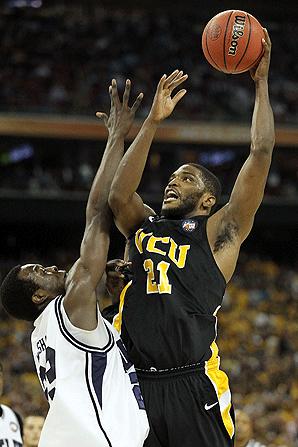Mid-majors pose biggest threat to Kentucky -- and your bracket
And then, last year, one team came along and shattered everything I'd ever held true about the NCAA tournament: VCU.
Shaka Smart's team wasn't the first mid-major Cinderella -- George Mason broke the Final Four wall in 2006, then Butler bulldozed it in 2010 and '11. But at least with hindsight there was some reasonable explanation for their feats. The veteran Patriots were one of Ken Pomeroy's highest-ranked defensive teams that year, had shared the Colonial regular-season title and beaten eventual Sweet 16 foe Wichita State a month earlier. The Bulldogs had a history of success, and, it would turn out, counted two future NBA players (Gordon Hayward and Shelvin Mack) in their starting five. Few saw either coming, but their runs weren't entirely implausible.
VCU, on the other hand, defied all logic. I was there in Dayton when the Rams -- a fourth-place, 11-loss CAA team whose mere inclusion elicited heated backlash -- began their run with an ugly 59-46 win over equally undeserving USC. "OK," I thought. "Good for them." But then I went to Chicago where two days later, that same VCU team held sixth seed Georgetown to 5-of-26 shooting from behind the arc in a 74-56 rout. Two days after that, the Rams put up 94 points against a veteran, defensive-minded Purdue team -- 20 more than the Boilers had allowed in a game all season -- in another blowout.
Statistically speaking, nothing about VCU's first 34 games indicated it was capable of either upset. Adjusted for tempo, its first- and third-most efficient offensive performances of the season came against the two best teams it had faced. And those were nothing compared with the improbability of the Rams' 71-61 Elite Eight upset of No. 1 seed Kansas, a game they led by 18 points in the first half. On the season, opponents had netted a 49.2 effective field-goal percentage, good for 174th nationally. VCU held the 35-2 Jayhawks to 37.1 -- its best performance of the year.
A ninth-place Big East team (UConn) winning the national championship? Unusual, but not out of character for a team with Kemba Walker. Eighth-seeded Butler returning to the national title game? Odd, but clearly Brad Stevens knows how to win in the NCAA tournament. There was simply no explanation for 11th-seeded VCU pulling five straight upsets to reach the Final Four other than the fact that it got really, really hot.
And because of that, I'm at a complete loss filling out this year's bracket.
On the one hand, perhaps I should write off last year's result as a fluke and carry on with my old steadfast instincts. On the other hand, four mid-major Final Four teams in six years is no fluke. The talent level in college basketball is only getting flatter, the teams on top more vulnerable, and almost any team seeded around 12th or better is capable of beating any other team in the field. String a few good performances together and you've got another VCU.
Cute little Murray State, a sixth seed, was on SportsCenter for three months. Wichita State, Creighton and Saint Mary's all reached the Top 20 this season. San Diego State, New Mexico and UNLV comprise a formidable trio from the Mountain West. Long Beach State, a No. 12 seed, may well be the best team in the West.
It's harder than ever to pick potential Final Four teams. You could make a case for any of those aforementioned mid-majors to make a run to New Orleans. Meanwhile, when I look at the big boys, all I see are their flaws.
Syracuse? Jim Boeheim's teams get bounced early almost every year. Why will this year be any different?
North Carolina? I see the 2012 equivalent of the enigmatic 2006 UConn team that George Mason beat, with Harrison Barnes playing the part of Rudy Gay.
Kansas and Missouri staged an epic final clash on Feb. 25. I enjoyed it. But this was Bill Self's least talented team in years, and it still won the Big 12 by two games over the Tigers.
Ohio State? Not tough enough. Michigan State? Tough enough, but not good enough. Duke? Not that good.
Realistically, at least one of these teams is probably going to make it to New Orleans, but it's hard to envision any of them winning six games.
The truth is, in 2011-12, Kentucky stands worlds above all others. It's not a popular thing to say, mostly because John Calipari is not a very popular guy, but deep down most basketball people know it's true. The Wildcats are the closest thing to an old-school, dominant college basketball team, complete with a premier shot-blocking center (Anthony Davis), NBA guys at every spot, equally proficient on offense (No. 2 in efficiency) and defense (No. 5).
So what if they're freshmen? Nowadays everyone relies on freshmen, but Kentucky's (Davis, Michael Kidd-Gilchrist and Marquis Teague) are better than everybody else's.
So what if Calipari's never won a title? It took Boeheim 27 years, Roy Williams 17. It's not an easy thing to do.
So what if the SEC wasn't loaded this year? Any team capable of going 16-0 in a major conference is capable of winning six straight games in a tournament.
If Kentucky loses before April 2, it won't be because of youth, or coaching, or style of play, or, in some detractor's eyes, karma. It will be because UConn, Wichita State, UNLV and most of their other potential South regional opponents -- including, yes, VCU -- are all capable of getting hot and reaching the Final Four. Or losing in the first round.
Trying to predict which one will do which is the true cause of Madness.





